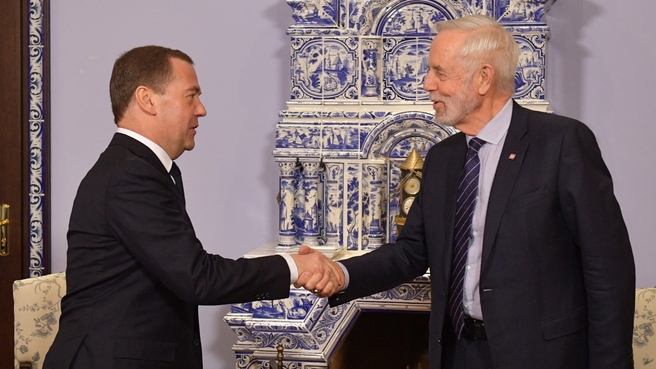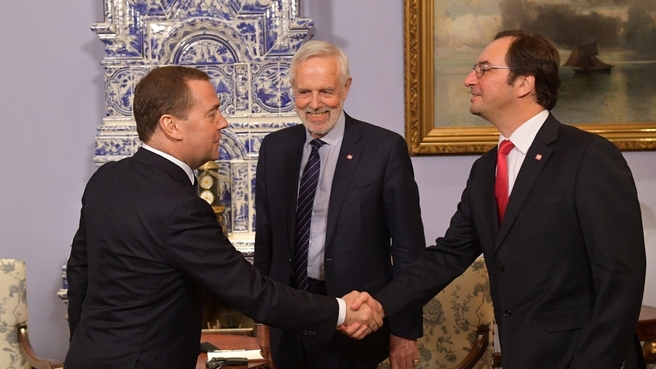The purpose of the forum is to facilitate the emergence of common initiatives to accelerate the development of digital economies in countries of the Eurasian Economic Union (EAEU) and to enhance their competitiveness. The main topic on the forum’s agenda is the integration of Eurasian technoparks, launching joint innovative projects, as well as sharing the best practices on promoting and supporting IT startups and young professionals.
Excerpts from Dmitry Medvedev’s remarks at the forum’s plenary session:
It has become a marvellous tradition to come here in early February to discuss the prospects of digitalisation across the EAEU space.
It is crucial for the five countries of the Eurasian Economic Union to become part of this agenda as quickly as possible.
The world is going through the so-called Fourth Industrial Revolution, and the possibilities offered by digital technology are rapidly expanding, including in the field of artificial intelligence, motor transport and quantum computing.
More and more sectors of the traditional economy and even everyday life are going digital.
We have laid the foundation for our joint work on the digital agenda. This was the job Russia set out to do last year during its presidency in EAEU bodies.
Our next step will be to adopt a roadmap for implementing the digital agenda. The Eurasian Economic Commission has already selected eight projects, and another 20 projects are in the pipeline.
We proposed to the members of the Union to start work on four priority integration projects. Of these, two can be implemented under the digital agenda. It is about creating Eurasian internet resources – educational, science, culture and tourism websites, and a digital platform for small and medium-sized businesses. We have developed such a platform, and it is being used quite successfully.
In our country, the digital programme is a national model. It provides for the creation of virtually all components of the ecosystem for the digital economy’s growth. We have earmarked about 1.8 trillion roubles for it for the next five years, or, roughly, $30 billion. Part of this money is from the federal budget, the rest from extra-budgetary sources.
We have pretty good experience in creating innovation ecosystems from scratch. Given the scale and diversity of our economy, this experience can be useful for our partners in the EAEU.
Now we have several tools to stimulate innovation. There is the national technology initiative – a long-term public-private partnership programme to stimulate industries, operating since 2015.
Another innovation leader is the Skolkovo Foundation, which also receives both federal and private funding.
Fundamental and applied scientific research continues to create the groundwork for the development of innovation. We also finance it, of course. Private companies and companies part-owned by the state make their contributions.
Over a period of the next three years, we are to approve at least 30 so-called digital transformation strategies of state corporations and part-owned companies.
We have established the Ministry of Digital Development as part of the new Government formed last year. It is not just a “transformation” of the former Communications Ministry – it implies a change in the development paradigm of this sector, that is, a change in ideology.
Security and digital sovereignty is also a very important field.
Digital integration is a common goal of the Eurasian five. If any of the countries say that they are not ready they will basically miss out on the opportunity for full-fledged communications with the other countries and will not be speaking the same language with them. Therefore, our progress towards the digital agenda, development of common services and a common communications model must be equally shared by everybody.
Since 1 January 2018, our country provided an opportunity for equal access to the software from the states of the Eurasian Union. The key condition is that such software must be included in the common registry of software and databases of the EAEU states. The registry operates alongside a similar Russian registry. Our law on contractual purchases regulates state procurement of software from the companies in the Eurasian five; therefore, copyright holders from the Eurasian Union can register their products in the registry and gain access to our market and participate in the procurement process.
We are ready to offer our Eurasian Union partners interesting software products and digital solutions. The scale of our economy allows for their mass production.
It is the private businesses that are responsible for the economy’s digital transition – by using the state-run infrastructure, both domestically and across the entire Eurasian Union.
We are supporting international projects. Our friends are also building competence centres.
Digital communications is a new special language of human interaction. If we do not learn how to use them together, it will have a negative effect on our competitiveness.
More to be posted soon…

